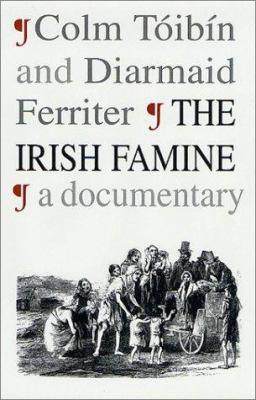
The Irish famine : a documentary
Available Copies by Location
| Location | |
|---|---|
| Community Centre | Available |
Browse Related Items
| Subject |
| Famines > Ireland > History > 19th century. Famines > Ireland > History > 19th century > Sources. Ireland > History > Famine, 1845-1852. Ireland > History > Famine, 1845-1852 > Sources. |
- ISBN: 0312300514
- Physical Description 214 pages : illustrations, map
- Edition 1st U.S. ed. --
- Publisher New York : St. Martin's Press, 2002.
Content descriptions
| General Note: | "Thomas Dunne Books." |
| Bibliography, etc. Note: | Includes bibliographical references (pages 205-206) and index. |
| Immediate Source of Acquisition Note: | LSC 34.95 |
Additional Information

Library Journal Review
The Irish Famine : A Documentary
Library Journal
(c) Copyright Library Journals LLC, a wholly owned subsidiary of Media Source, Inc. No redistribution permitted.
Novelist Toibin (Blackwater Lightship) and historian and lecturer Ferriter (Dublin City Univ.) have edited and annotated a collection of letters, news reports, editorials, and statistics gathered from primary and published materials about the Irish famine of 1846-48. Contrary to a thesis first introduced in Cecil Woodham-Smith's The Great Hunger (1963), the editors argue that the famine was self-inflicted, shifting blame from the British government to Irish landowners and merchants, who aggravated the distress and profited from it. But this work further accuses historians of ignoring the role of class in the famine. Trying also to provide a study of Victorian language and psyche, the editors juxtapose death tolls and horror stories from the provinces with castigations of the indolent Irish and recipes for cooking rotten potatoes. Having written just 38 pages of narrative, the editors advance their argument using the words of famine eyewitnesses and contemporaries. Some of the excerpts are exceptional, and the concept is powerful, but as a result of the unconventional approach the selections look random and unstructured. Large academic collections will find this title an interesting exercise in alternative scholarly editing. Robert Moore, Bristol-Myers Squibb Medical Imaging, Billerica, MA (c) Copyright 2010. Library Journals LLC, a wholly owned subsidiary of Media Source, Inc. No redistribution permitted.

Publishers Weekly Review
The Irish Famine : A Documentary
Publishers Weekly
(c) Copyright PWxyz, LLC. All rights reserved
Between 1846 and 1849, the potato blight left some one million Irish citizens dead of starvation or disease; Booker Prize-nominated novelist Colm Toibin (The Blackwater Lightship) and historian Diarmaid Ferriter team up to reconsider the tragedy (was it the fault of the British?) in The Irish Famine: A Documentary. Toibin pens a historiography that acknowledges "no narrative now seems capable of combining the sheer scale of the tragedy..., the complex society which surrounded it and the high politics which governed it," while Ferriter compiles a wide range of documents, including letters, newspaper articles and relief commission reports, to offer a scholarly look at the days of (in the words of a parish priest) "calamity" and "universal doom." (c) Copyright PWxyz, LLC. All rights reserved

Kirkus Review
The Irish Famine : A Documentary
Kirkus Reviews
Copyright (c) Kirkus Reviews, used with permission.
Booker shortlistee TóibÃn (The Blackwater Lightship, 2000, etc.) collaborates with historian Ferriter (Dublin City Univ.) to introduce and annotate contemporary documents from Ireland's devastating mid-19th-century famine. This is not yet another ringing indictment of Britain for solely inflicting the "Great Hunger" that ravaged Ireland for nearly a decade beginning with the onset of a potato blight in 1845. That notion, claims TóibÃn in his prefatory essay, was abandoned decades ago by serious Irish historians. Instead, he presses the question of why Irish intellectuals and literati often seem reluctant to delve into a disaster whose causes were as complex as its results were tragic. TóibÃn's suggestion: the degree of profiteering engaged in by landholding and mercantile Irish, even as they witnessed the decimation of the poor among them, remains difficult for many to confront. The Ferriter-collected documents do contain, however, ample testimony to the role British incompetence, ethnic hatred, religious bias, and sheer inhumanity played in the administration's approach to what became more of an "Irish" problem as it deepened. Factions in both countries found in the famine an opportunity to effect the "removal" of one-quarter or more of the Irish population through forced eviction from small holdings, with subsequent emigration as the only alternative for most to starvation or its companion ravages of disease. The collected letters, public postings, journalism, speeches, etc., summon both fact and emotion: personal accounts often resonate with agony but also chilling understatement of one of the great human tragedies on record by those forced to deal directly with it. They can still leave a reader room, the authors suggest, to agree with John Mitchel (1861) that "the almighty sent the potato blight but Britain caused the famine," or to conclude as well, writes TóibÃn, that "the Irish merchant classes and middlemen made a fortune out of the Famine . . . on the ruins of the smallholding class." Socioeconomic surgery on a national scale, with no anesthetic. Copyright ©Kirkus Reviews, used with permission.


